Supplements To Improve Adrenal Fatigue
The adrenal glands house over 50 hormones that are used to help us adapt to stress, reproduce, and heal. When our body perceives a threat, a region of the brain called the hypothalamic-pituitary gland signals to the adrenal glands to pump out stress hormones such as cortisol, epinephrine, and norepinephrine. This is a normal and natural response that is life saving and allows us to do things like exercise, play sports, dance, and have fun.
There are certain nutrients the body needs to produce efficient amounts of adrenal hormones. When we are under a lot of stress, we deplete these nutrients to produce adrenal hormones and metabolic energy.
Over time, when we are exposed to chronic stress, our hypothalamic-pituitary-adrenal (HPA) axis becomes unable to effectively produce the adrenal hormones and metabolic energy we need to keep up with our demands. This results in adrenal exhaustion and body burnout.
The following nutrients will help you adapt more effectively to stress, take the pressure off of your adrenal glands, and give you more stamina and a stronger resistance to developing adrenal fatigue and adrenal exhaustion. Here are the most important herbs and supplements to improve adrenal fatigue.
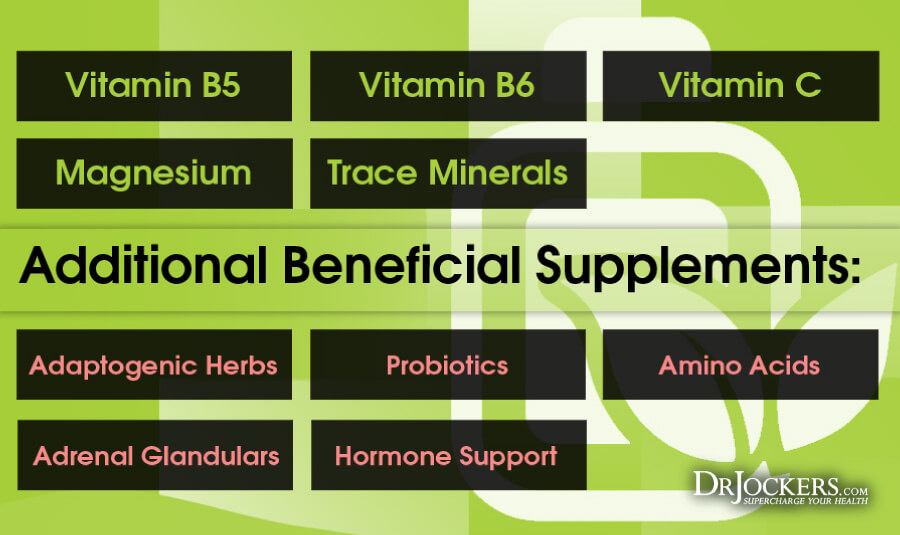
Key Nutrients Needed:
There are other nutrients, such as using mitochondrial support, with things like CoQ10, Alpha lipoic acid, N-Acetyl Cysteine, and Acetyl-L-Carnitine that can be very helpful for adrenal function as well.
Additionally, antioxidant compounds that help reduce inflammation in the body will cross over and have a mild effect on improving adrenal function as well. However, I am focusing on the most important and widely recognized nutrients and support supplements for adrenal health.
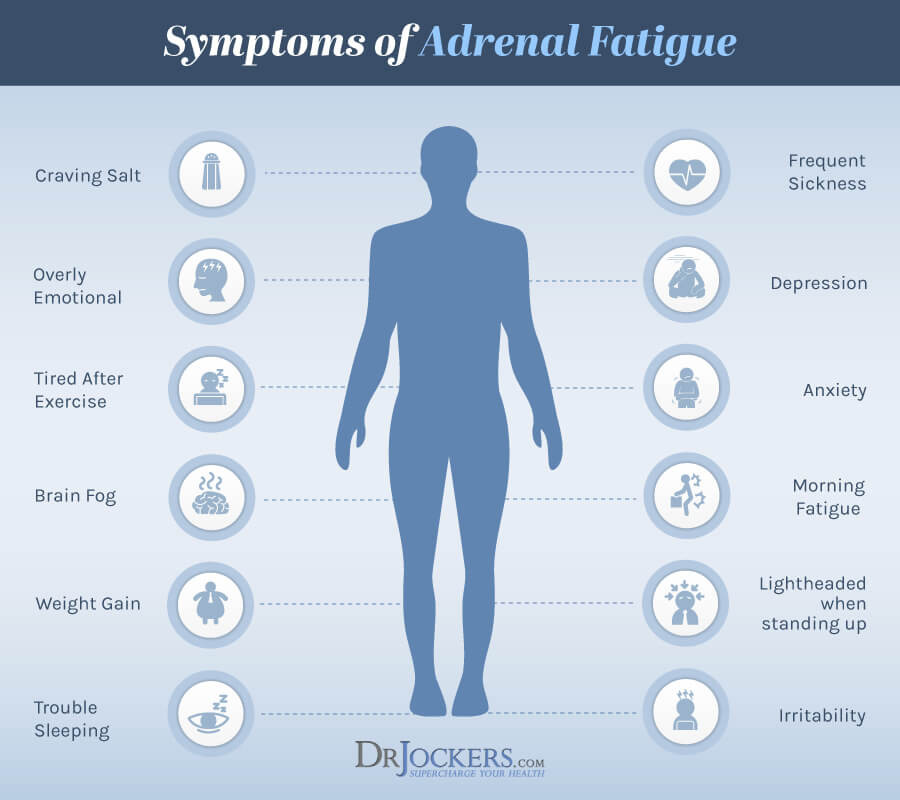
Vitamin B5: Panthothenic Acid
This nutrient is key for the production of Coenzyme A (CoA). This is one of the most important molecules needed to sustain life. CoA is a critical player in energy metabolism and works to allow carbohydrates, fats, and proteins to be used as fuel sources.
B5 is also necessary for the production of the stress hormone cortisol and the sex hormones estrogen and testosterone. Individuals who have adrenal fatigue often deplete their B5 levels to produce cortisol and need to supplement to continue to produce cortisol and avoid adrenal exhaustion (1).
Additionally, they will need B5 to support mitochondrial energy production and healthy sex hormone levels. I will start clients on dosages ranging from 50-100 mg – 2x daily.

Vitamin B6: P-5-P
Vitamin B6 is a major nutrient for the production of the neurotransmitters serotonin and dopamine, which play a large role in mood, sleep, energy, and mental drive. Additionally, B6 is a key part of the body’s ability to manufacture the stress hormones norepinephrine and epinephrine.
B6 is important for the balancing of sodium and potassium around every cell in the body, and promoting red blood cell maturation and oxygen delivery to the cells of the body. B6 is commonly used to help individuals with depression, anxiety, and hormonal imbalances (2).
It is best to get B6 in the pre-activated form called Pyridoxal-5′-Phosphate and start clients on dosages ranging from 15-30 mg – 2x daily.
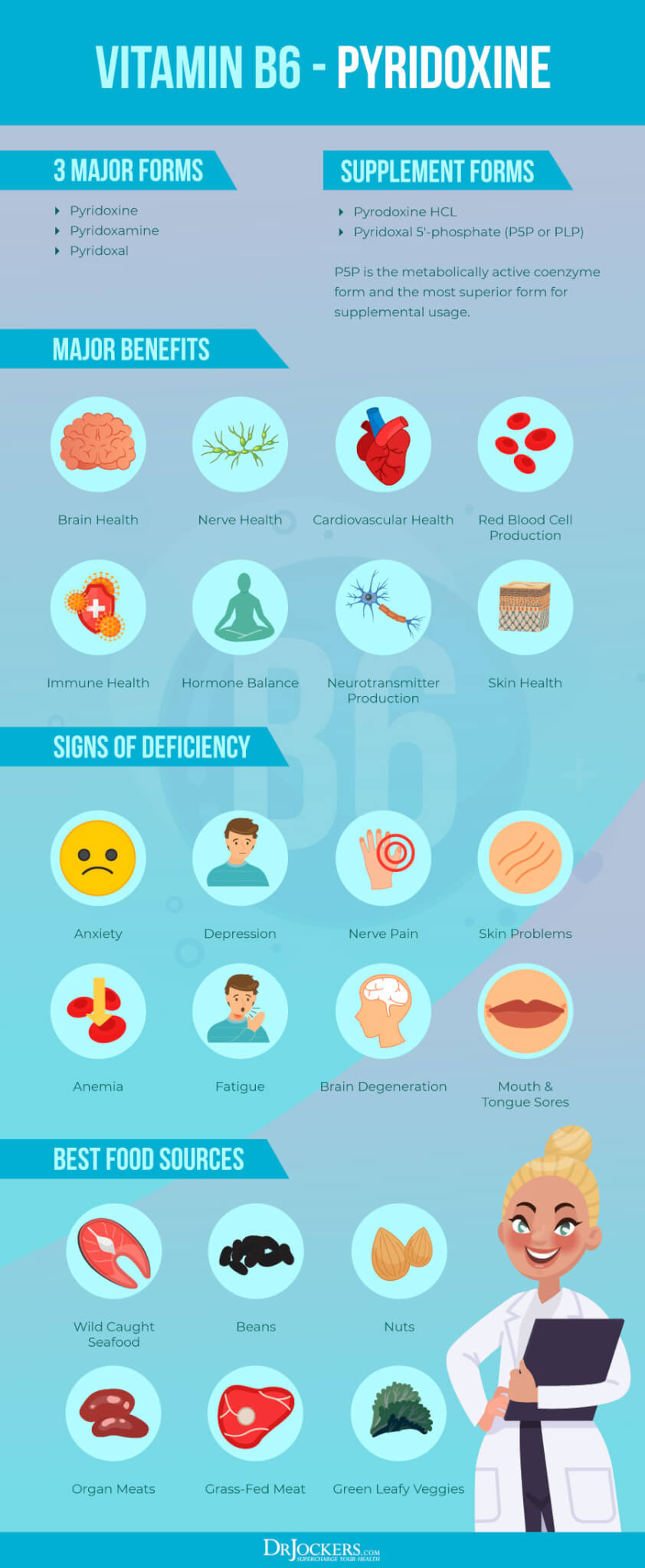
Vitamin C:
This antioxidant is directly involved with the production of cortisol in the adrenal cortex. In addition, it boosts the immune system and protects the adrenal tissue from excessive oxidative stress involved with heavy adrenal hormone production.
Studies have shown that vitamin C helps to modulate the levels of cortisol, epinephrine, and norepinephrine in the bloodstream (3).
I will start clients with 500-1000 mg – 2x daily in a buffered form in combination with an equivalent amount of citrus bioflavonoids, which enhance the utilization of vitamin C.
Magnesium:
Magnesium is one of the most used minerals in our bodies. We need roughly 1000 mg/day for a healthy and active individual to keep up with the demands of the body. If you are under more stress, you will need 1500-2000 mg per day. Magnesium’s importance to the body is comparable to oil for a car engine. Without it, we will sputter on fumes.
Roughly 68% of society does not consume the RDA level, and many researchers believe that roughly 80% of Americans are consuming too little (4, 5). Insufficient magnesium causes the body to struggle to utilize proteins and enzymes, including producing neurotransmitters and hormones (such as cortisol, epinephrine, etc.). In addition, the body is unable to methylate and detoxify or utilize antioxidants such as vitamin C.
I start my clients on dosages ranging from 200-400 mg, 2-3x daily. I have seen this make a HUGE difference in energy, sleep, mood, and creativity.
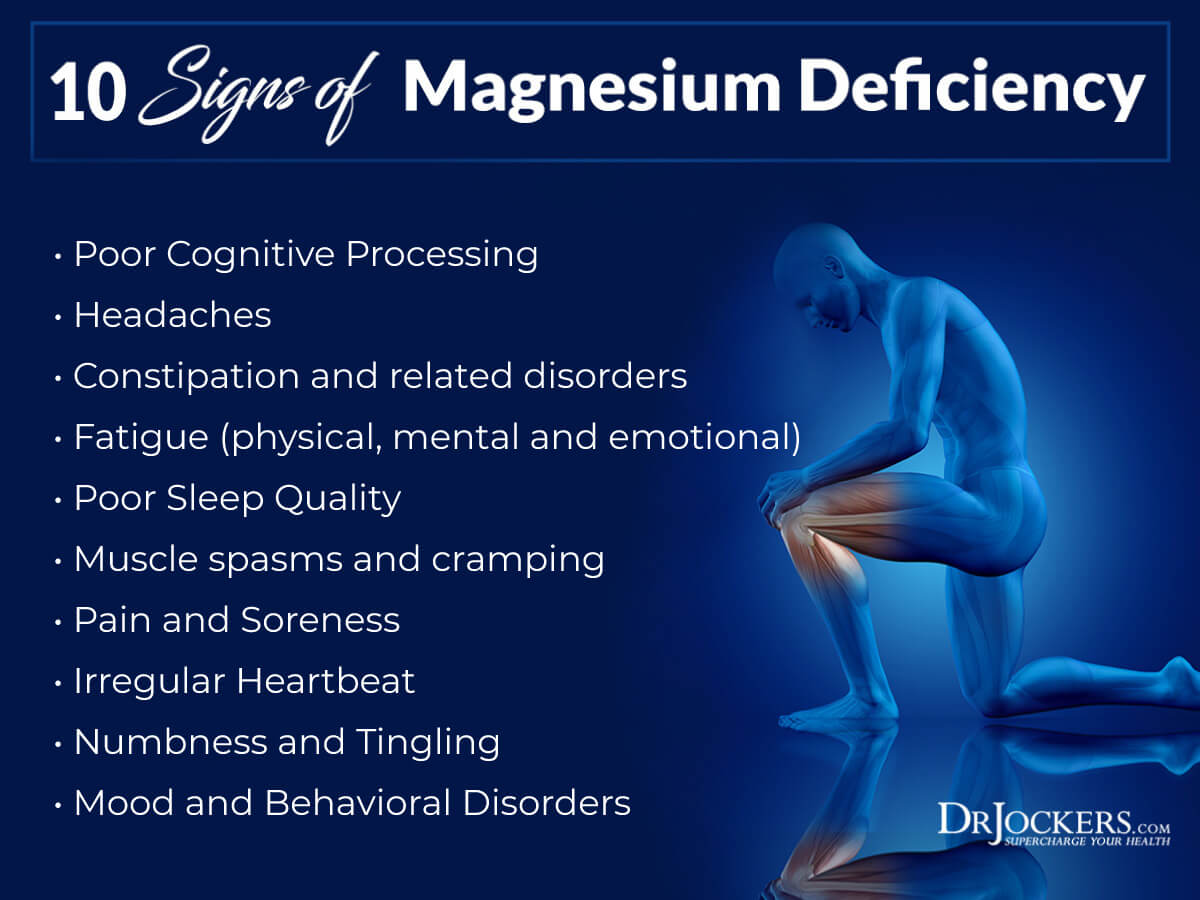
Trace Minerals:
When we are in a state of adrenal fatigue, our physiological processes are moving fast and using up raw materials. This depletes key electrolytes and other minerals.
You can certainly supplement with trace minerals, but I recommend consuming sea vegetables such as dulse, nori, and kelp. Additionally, consuming bone broth and soups and stews made with bone broth is excellent. Some veggies have a high amount of trace minerals, such as celery and cucumbers.
I also recommend having pink salts such as Himalayan sea salt, which has 84 trace minerals. Using a lot of good salts and good water is very important for someone dealing with adrenal fatigue.
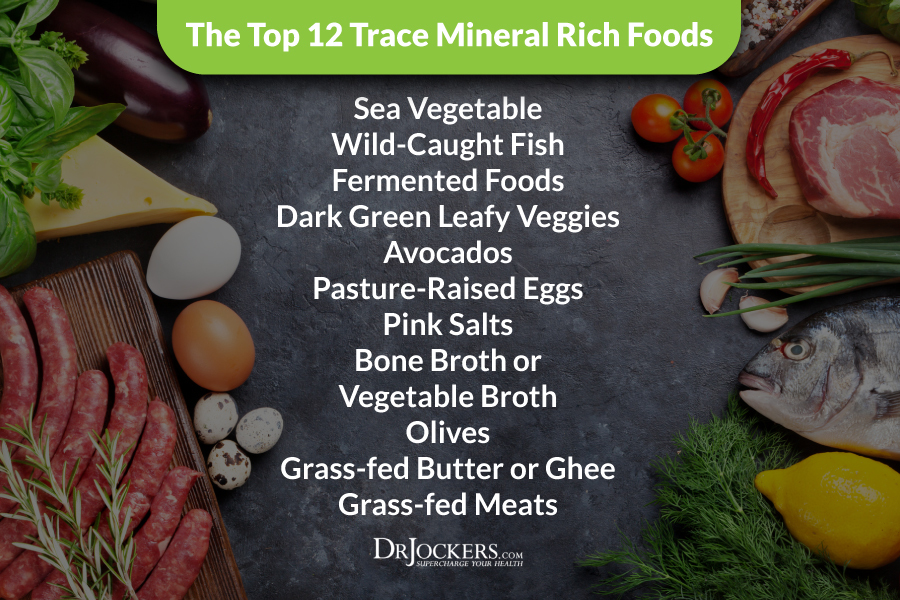
Probiotics:
Adrenal fatigue is typically associated with a bad bacterial balance in the gut, called dysbiosis. When we are under chronic stress, we create an internal environment that favors the overgrowth of bad microbes, and we are unable to heal the gut lining (6).
Probiotic supplements help to create balance in the microbiome, heal leaky gut, and reduce stress on the body. I start my clients with the most powerful, research validated strains such as Lactobacillus acidophilus and plantarum, as well as Bifidobacterium longum and lactis. I will have clients take 30-100 billion CFUs daily away from meals to restore microbial harmony.
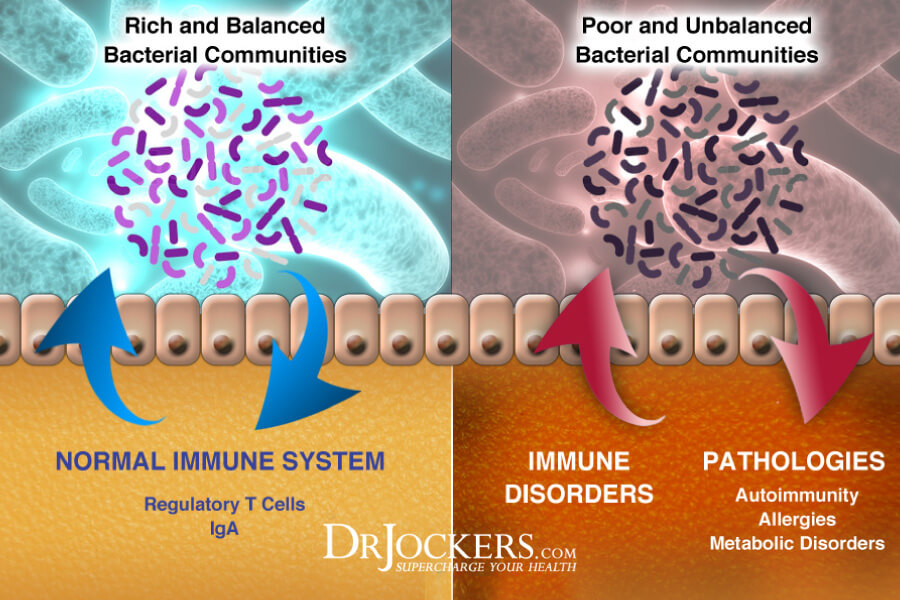
Herbal Adaptogens:
There is a specific group of plants with unique characteristics that are called adaptogenic herbs. These herbs help to coordinate how our body adapts to stress by modulating the utilization of our stress hormones (7, 8).
Adaptogens have adapted themselves over thousands of years of weathering extreme environmental stressors. Many of these grow in the mountains and in areas of extreme temperature ranges.
Rhodiola, as an example, grows in some of the coldest regions in the world, including Siberia, Arctic regions, and the Appalachian mountains in the Northeastern United States. It is also found in Scandinavia, Iceland, the mountain regions of Europe, and Asia.
Mountains are known to face both extreme cold at night and extreme heat (due to their closer proximity to the sun) during the middle of the day. Plants like Rhodiola and many other adaptogens have evolved to take on an array of antioxidant compounds that help them survive such harsh environmental conditions.
These herbs pass these beneficial antioxidant compounds onto us when we consume them. Not only do these compounds reduce oxidative stress, but they also help to promote physiological homeostasis by improving our HPA axis.
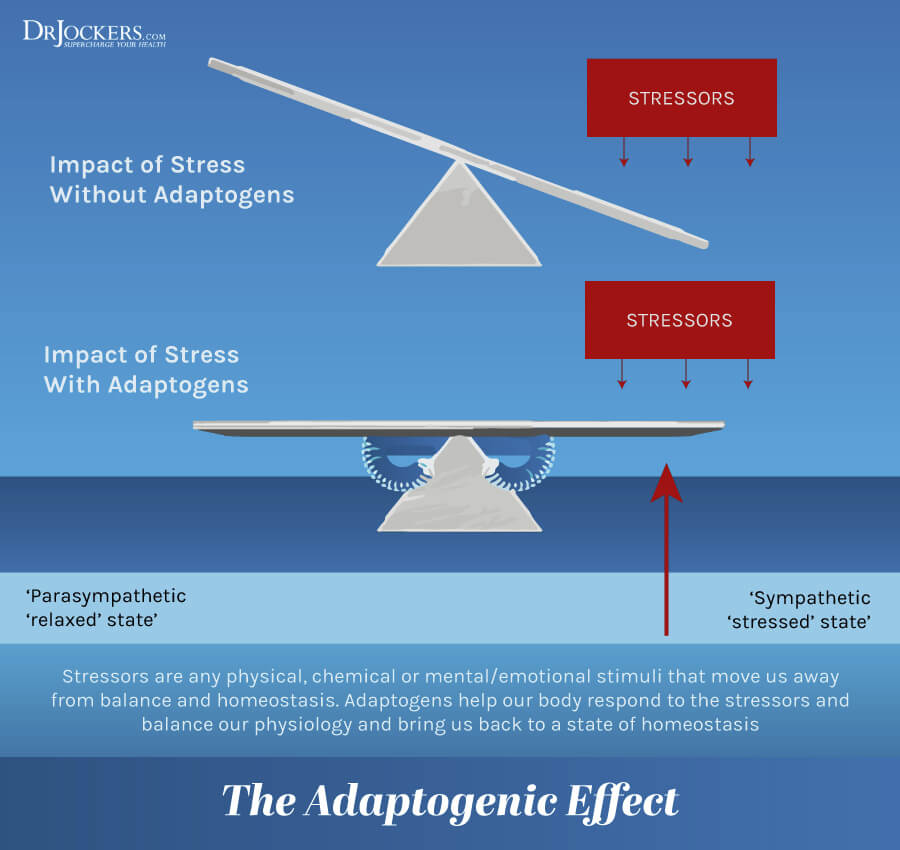
Adaptogenic herbs include Panax ginseng, ashwagandha, rhodiola, cordyceps, astragalus, holy basil, Siberian ginseng (Eleuthero root), and maca, as well as others. Start with small doses of these and gradually go up.
I typically recommend these herbs in the morning and mid-afternoon for most people. Some adaptogens work well for reducing high evening cortisol. Ashwagandha in particular is good for this. Lemon Balm and lavender have adaptogenic qualities that also help to reduce higher evening cortisol and adrenaline levels.
Many of the other herbs, such as cordyceps, rhodiola, and ginseng, are better at increasing your energy and mental clarity. If you take them at night, they could possibly keep you up. These are great in the morning and mid-day, or mid-afternoon.
Just like anything else, you may notice that you respond better to certain adaptogenic herbs than others. If you notice the herbs make you more tired and inflamed during the day or stimulate you at night, then it may be best to avoid them, as you may be having a stress response to the herb itself.
Here is how I recommend using these herbs.
Ashwagandha: Begin with 400mg – 1x per day, and if you feel good using it, you can gradually go up to 400-800 mg – 2x per day
Astragalus: Begin with 500mg – 1x per day, and if you feel good using it, you can gradually go up to 500 mg – 1000mg – 2x per day
Cordyceps: Begin with 400mg – 1x per day, and if you feel good, you can gradually go up to 400-800 mg – 2x per day
Panax Ginseng: Begin with 200mg – 1x per day, and if you feel good, you can gradually go up to 400mg – 2x per day
Holy Basil: Begin with 300mg – 1x per day, and if you feel good, you can gradually go up to 300-600mg, 1-2x per day
Maca: Begin with 1.5g -1x daily, and if you feel good, you can gradually go up to 1.5-3.0 g – 2x daily.
Rhodiola: Begin with 100mg -1x per day, and if you feel good, then go up to 100-200 mg – 2x per day
Siberian Ginseng: Begin with 100mg -1x per day, and if you feel good, you can gradually go up to 200 mg – 2x per day
For good sleep at night, I recommend diffusing lavender, chamomile, or lemon balm (or some combination of all of these), beginning about an hour or two before bed. You can also put these in a bath and soak them with Magnesium salts to help restore the adrenals and lower stress hormone production.
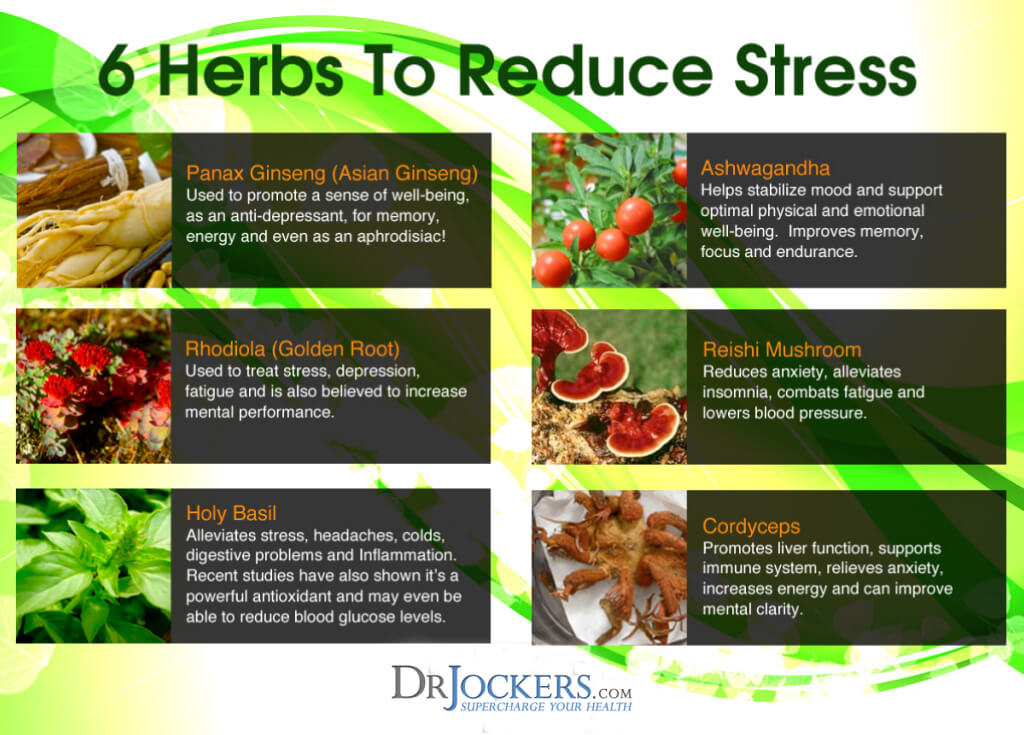
Licorice Root:
This herb, primarily the glycrrhizinate portion, helps to raise cortisol and aldosterone levels (9). This is only recommended in cases of low cortisol and hypotension. If one has hypertension, then one should avoid licorice root so as not to raise aldosterone too high.
There is another form of licorice root called deglycrrhizinated licorice root (DGL) that has the glycrrhizinated portion removed. This is used to help reduce H Pylori and other pathogenic bacteria and to soothe the stomach and intestinal membranes.
To support the adrenals, however, we are looking for low doses of licorice root with the glycrrhizinated portion still intact. I recommend this in 35mg droplets, such as in this product here. Take 1-2 droplets at times when cortisol is low throughout the day.
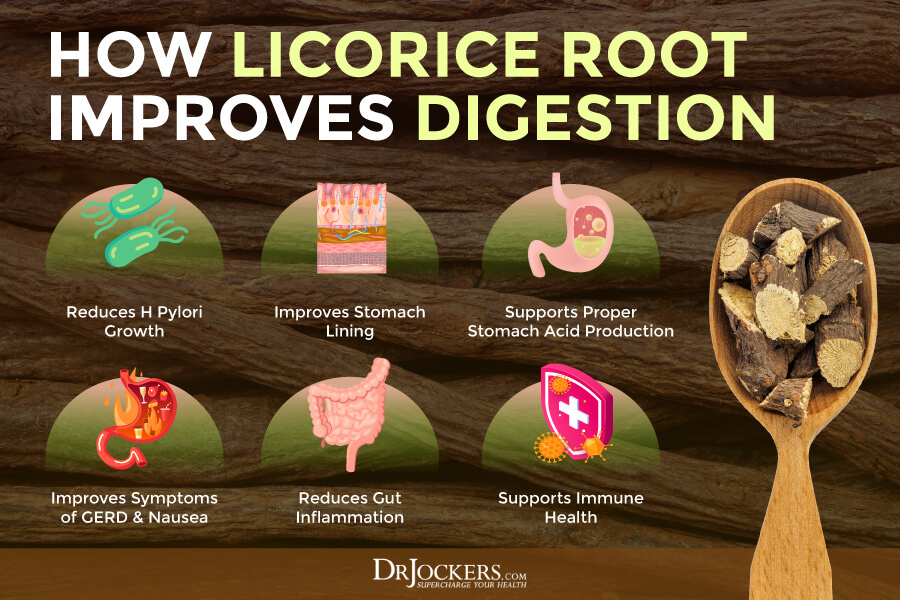
Adrenal Glandulars:
These are specific adrenal supplements that are made up of adrenal gland tissue from either porcine or bovine (pig or cow). Some of these supplements use the whole adrenal gland, while others only use the outer cortex.
This can be an excellent overall supplement to help restore adrenal function as the glandulars are rich in mitochondrial support nutrients such as CoQ10, L-carnitine, glutathione precursors, B vitamins, and amino acids necessary for good adrenal function.
We use bovine adrenal glandular in our Adapt Strong formula here.
Amino Acids:
Certain amino acids can be very helpful for individuals with adrenal fatigue. Amino acids are best taken 30 minutes before a meal or 2 hours after a meal. This reduces competition with other amino acids from the meal that was consumed.
Here are the most commonly used amino acids for HPA dysfunction and adrenal fatigue:
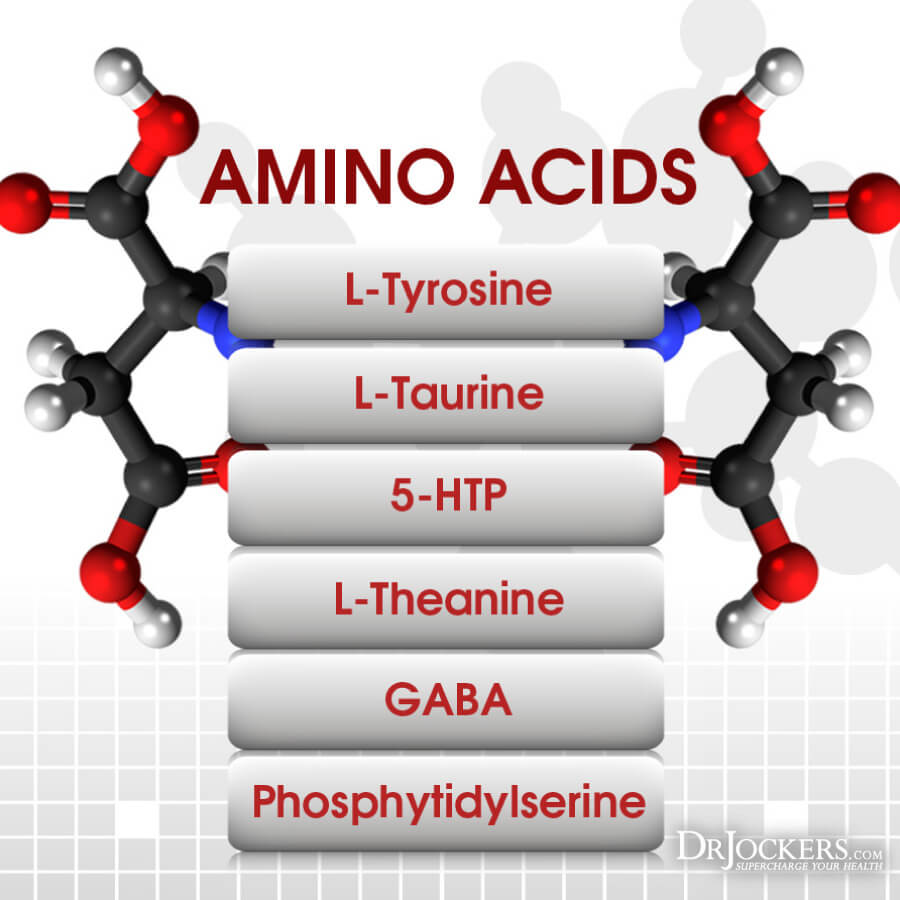
L-Tyrosine:
This is an amino acid that is a precursor to the production of cortisol, dopamine, norepinephrine, and epinephrine. For someone with low cortisol, using tyrosine may be helpful in the production. This should not be used by someone with high cortisol, as it will help produce more.
If you choose to supplement with this, you should look for an improvement in focus and concentration. Begin with 100mg, 1 time, and if you don’t notice anything or feel good with it, you can gradually bump this up, going up 200 mg, and ramp up to 500 mg max.
You can spread this out and take dosages 2-4 times daily. If you are feeling good with 500 mg, you can take that several times daily as well. If you notice anxiety, worsening fatigue, and/or irritability, then drop the dosage down.
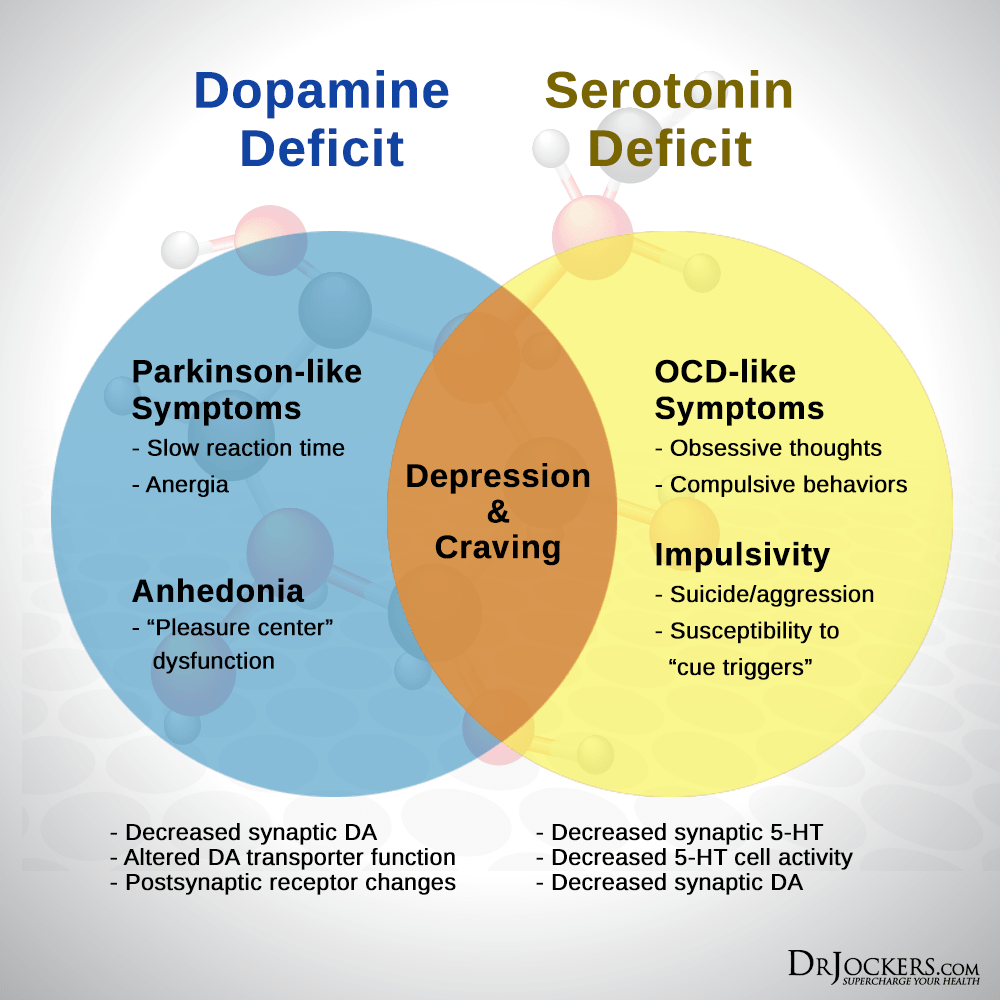
L-Taurine:
This is a neuroprotective amino acid that works to help maintain cell stability. It also has antioxidant activity, and supplementation has been shown to increase the inhibitory neurotransmitter in the brain called GABA.
This should help improve sleep, mood, calmness, and relaxation. Begin with 300 mg – 1x daily, and you can ramp up to 1500 mg – 1-2x daily max. The safe upper limit without side effects is 3 grams daily.
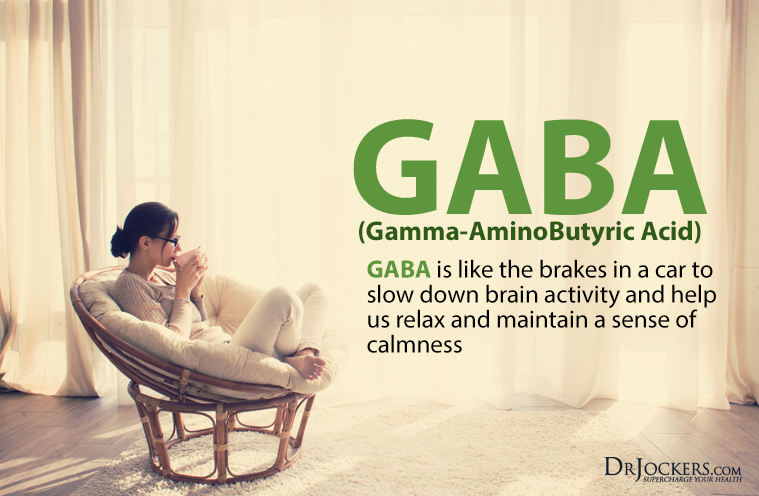
5-HTP:
5-HTP (5-hydroxytryptophan) is a precursor to the neurotransmitter serotonin. It is easily absorbed in the intestines and has been shown to easily cross the blood-brain barrier (10).
Serotonin is important for a number of brain activities, influences norepinephrine and dopamine, and regulates mood and behavior, including food cravings. The use of 5-HTP has been shown to help improve a sense of calm and relaxation (11).
Serotonin in our brain helps us to feel good and calm, but it is also a precursor to the sleep hormone melatonin. Using 5-HTP supplementation for someone who needs this should help that individual have improved mood and energy and sleep better. This shouldn’t be taken by anyone who is currently using an SSRI type antidepressant.
If the individual is struggling with insomnia, then follow this protocol. I typically begin with 50-100 mg at night before bed. From that point, if the individual is still not sleeping well, then try increasing the dosage by 50 mg every week until good sleep is attained or you reach the maximum 500 mg. Over time, as the adrenals get better, you should be able to reduce the dosage.
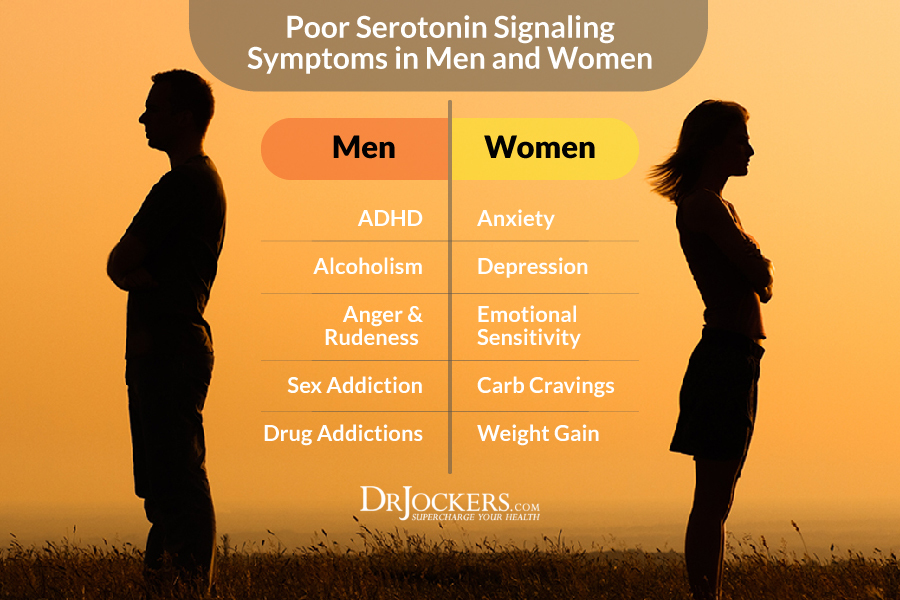
L-Theanine:
This amino acid helps to modulate the HPA axis in such a way as to dampen excitatory neurotransmitter and alpha brain wave activity. This results in relaxation support and improved sleep quality (12, 13, 14).
Using 100 mg as a standard dosage is usually effective, and titrating up by 50 mg each week, if necessary, to a maximum of 500 mg can be done if necessary.
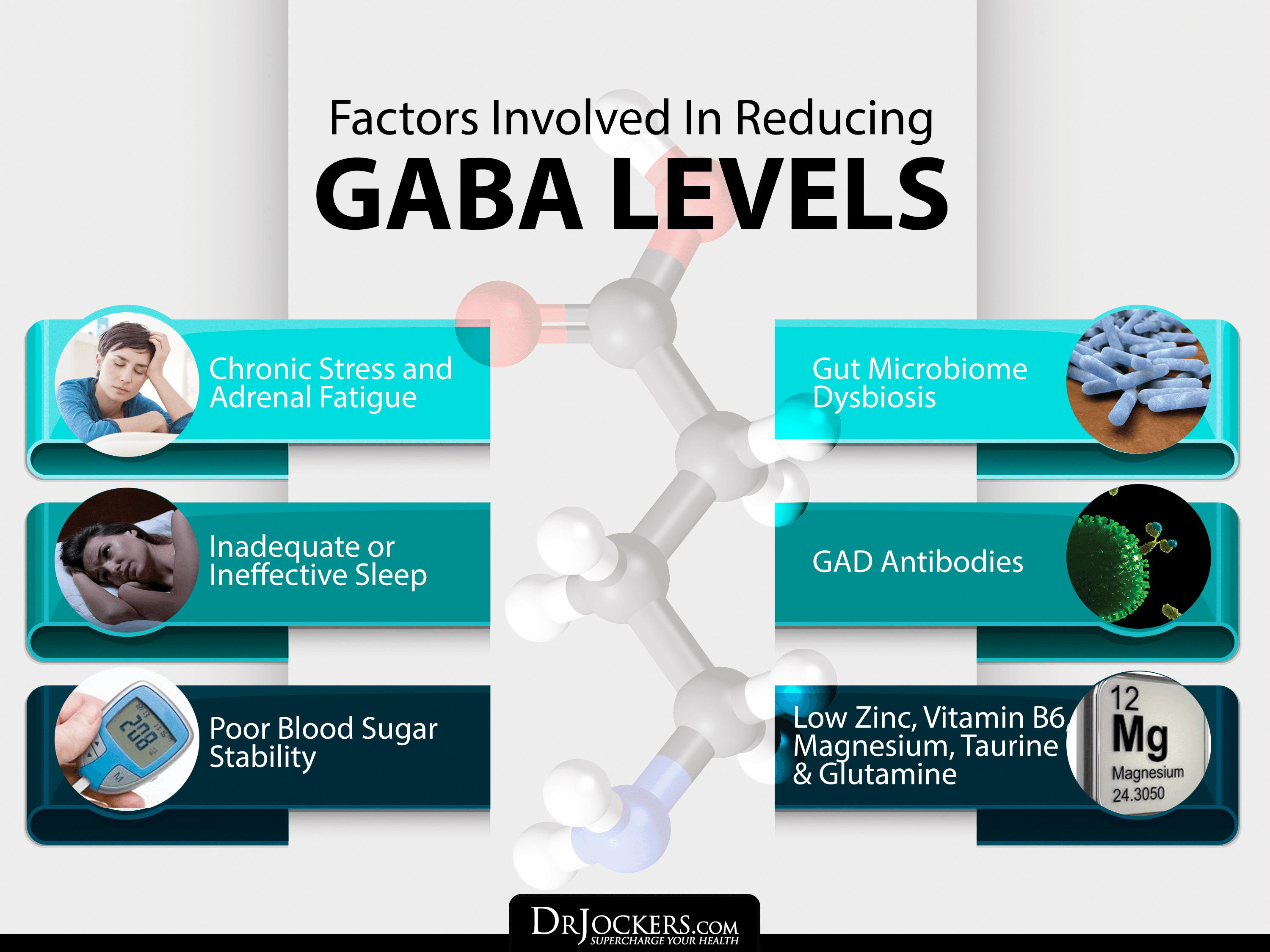
GABA:
GABA (gamma-aminobutyric acid) is an important inhibitory neurotransmitter found in 30% to 40% of the brain synapses. It helps calm the brain by neutralizing the excitatory effects of glutamate.
Research suggests that GABA supplementation or optimal GABA function in the brain positively affects neurological health, the body’s response to stress, mood, alpha and beta brain waves, and sleep (15, 16).
This can be great for someone with anxiety and insomnia in particular. It is said not to be able to cross the blood-brain barrier in a healthy individual, but people with adrenal fatigue will have greater permeability in their blood-brain barrier and will take up and respond to GABA.
Begin with 100 mg and gradually go up by 50mg per week if needed to a maximum dosage of 500 mg. The key is to find the right dosage that you feel best with.
A great overall supplement I use that has a combination of these amino acids is Mood Protect here.
Phosphytidylserine:
This compound is great at improving hypothalamic-pituitary function. This is the key regulator in the HPA axis, and it improves the feedback between the brain and the adrenals (17). You can take up to 600-800 mg orally as a highly effective dosage or do a topical application that crosses into the bloodstream transdermally.
I personally like to support the HPA axis with a combination supplement that uses a smaller dosage of phosphytidylserine and mitochondrial support with CoQ10, alpha lipoic acid, Acetyl L-carnitine, and N-Acetyl Cysteine. This product has helped me and many of my clients dramatically improve adrenal health and mental energy.
Hormones:
I don’t use hormone replacement with my clients and would rather focus on addressing major deficiencies, reducing toxicities, and supporting the body’s healing process. With that said, there is a time and place for adrenal hormone support in the form of small doses of pregnenolone and DHEA. However, please don’t use them without the supervision of a qualified medical professional.
Pregnenolone:
This is the major precursor to many of the key hormones that are produced by the adrenal glands. The normal dosage is 25mg, spread into 2 dosages. This is contraindicated in cases of hyperthyroidism and should never be taken after 6 PM, as it blocks GABA production and can lead to insomnia.
Warning signs of too much pregnenolone can include heart arrhythmias, including palpitations or abnormal heart rhythms, insomnia, and/or headaches. If you have any of these while taking pregnenolone, then be sure to consult with your functional health practitioner.
The pregnenolone product I recommend for clients can be found here.
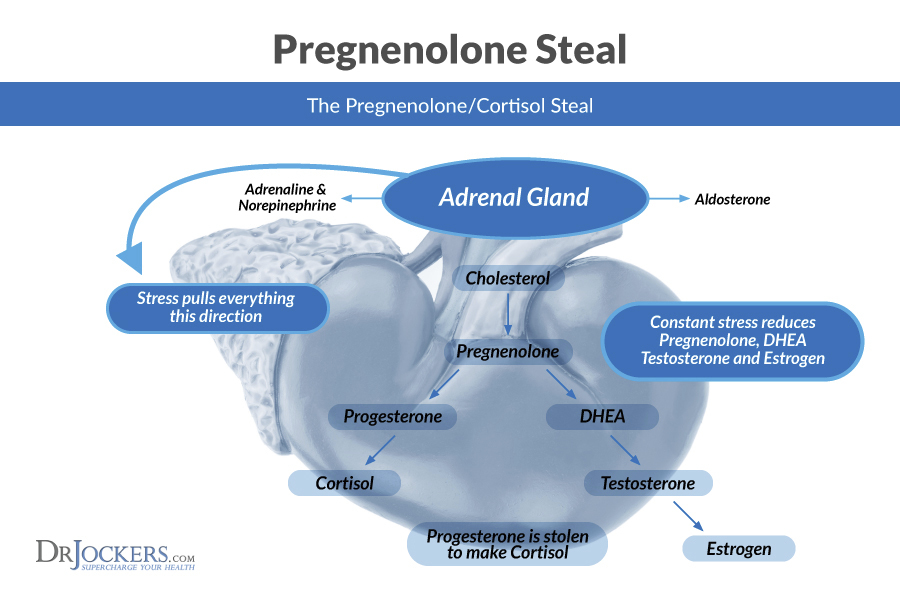
DHEA:
This is another precursor hormone for the production of both stress and sex hormones. Using this can be very helpful, but titrating the dosage can take clinical skill. The average adult dosage is typically between 10-25 mg, but may start as small as 5mg.
DHEA is the precursor to the sex hormones testosterone and estrogen. If the individual has liver stress, methylation problems, and/or a history of sex organ cancer, such as breast, uterine, ovarian, or prostate then it is best to avoid DHEA supplementation.
Starting with small doses is key as some women will turn DHEA into testosterone and increase their risk of polycystic ovarian syndrome (PCOS). Some men with elevated aromatase enzymes will turn this into estrogen. This is one reason why it is important to have a functional health practitioner trained in the use of these bioidentical hormones before starting usage.
Warning signs of poor DHEA utilization would include abnormal heart rhythms, increased blood pressure, insomnia, facial hair, or hair loss. If you have any of these while using DHEA, immediately consult with your functional health practitioner. The DHEA product I recommend for clients can be found here.
Summary:
There is a wide variety of key nutrients and compounds to support adrenal hormone and neurotransmitter production and the overall health of the HPA axis. Some of these nutrients you can begin supplementing with immediately, while others should only be used with the care of a trained practitioner.
If you want to work with a functional health coach, I recommend this article with tips on how to find a great coach. Our website offers long-distance functional health coaching programs with our world-class team of health coaches. For further support with your health and other goals, just reach out—our fantastic coaches are here to support your journey.

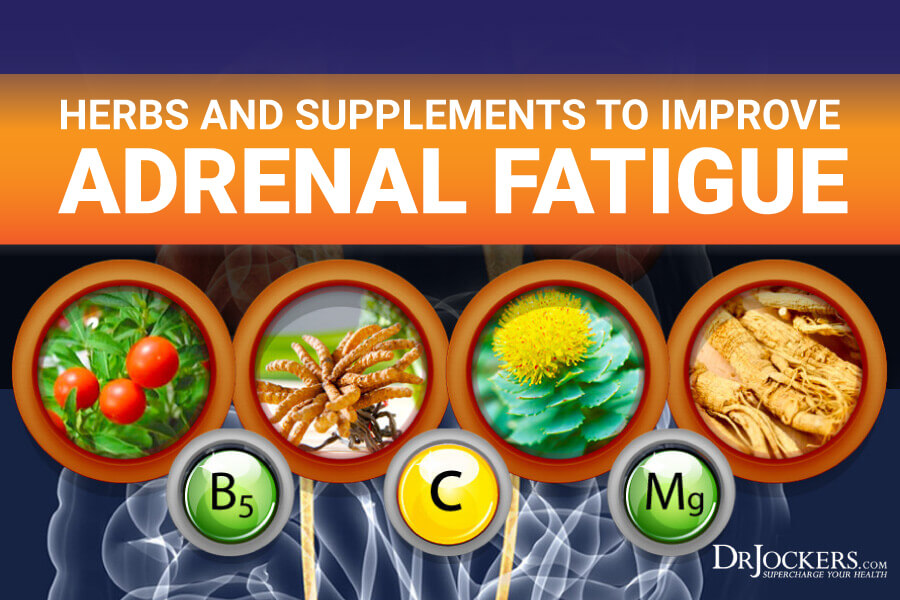




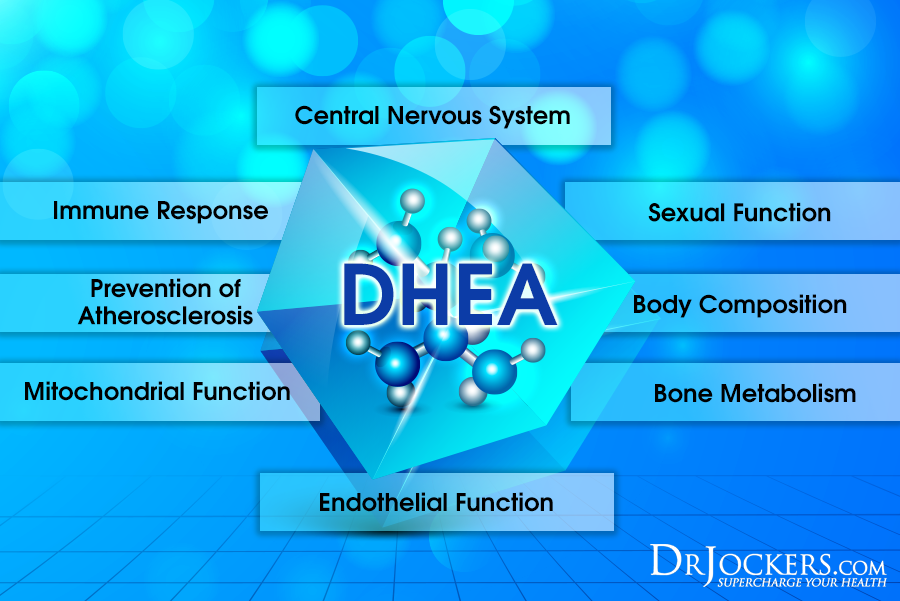



Hi David, Do you not find the studies linking chronic carbohydrate restriction with HPA axis dysfunction alarming?
Thanks
Josh
Hey Josh, this is why we recommend a cyclical ketogenic approach. It works very good for individuals with adrenal fatigue.
Dr David
In 2008 had nephrectomy of left kidney do to cancer. My right kidney is at 62% function. Is it a good idea to be on keto way of life? I am 79 and over weight, like very much to loose many pounds. I have been on keto from Oct 1st. My weight goes up and done. I measured with keto stick and Am on moderate ketosis. The reason I started keto not only to shad pounds, but my knees started to hurt starting this may 2016. I am enthusiastic watching your tape.
Sorry to hear about your history Clelia! Praying for you to get great results with keto!
Have you ever use standard process products with your patients?
Dr. Karen Cann
Awesome list of Adaptogens but you forgot Vitex(for women only).
It has its own article! https://drjockers.com/6-benefits-chasteberry-pms/
My production of cortosol has been damaged from the chemotherapy used to save this 84 YO man from aggressive prostate cancer. Should I stop the Gaba? I am taking hydrocortisone to supplement my adrenal glands.
thanks for your information.
David, I suspect my vegan 14 year old may be having deficiency of amino acids, she may be showing early symptoms of adrenal fatigue. Apart from being vegan, her diet is highly restricted since she is allergic to many many foods. I would like to use a complete amino acid supplement for her, not sure about dosage. She’s very petite and weights 85 lbs. Could you please suggest dosage for her? Is half the dosage for adults safe?
Hey Sandra, 1-3 scoops of this throughout the day should help with amino acid needs: https://store.drjockers.com/products/amino-strong
Thank u so much Dr Jockers for your wonderful write up. It is very helpful. I always feel tired,weak and dizzy. Consulted and was diagnosed of adrenal insufficiency. I wish to find out if eating keto diet will help in my situation.
Hey Yvonne, so sorry to hear this! I wouldn’t do a keto diet in your situation but certainly an anti-inflammatory, low-carb diet. https://drjockers.com/heal-adrenal-fatigue/
Dr Kicker,
Think I am in adrenal burnout, I have the big belly skinny legs. I am looking for something to actually reduce cortisol levels as I suffer from Ocd, which has impacted my life so much I don’t go out, no friends, families members avoid me.psychiatrist remarked to me one day that OCD is caused by chronic stress.its a vicious cycle.so the question I want to ask is if that I am caught in high cortisol levels ie adrenal burnout and there is no off switch only to try and reduce high cortisol levels, due to the anxiety based OCD , my question is , would this help to get rid of Ocd. I have tried everything ,meds and vitamins . Nothing has worked.
So sorry to hear that Eileen! Yes, I would highly recommend the Brain Calm magnesium for this and read this article: https://drjockers.com/14-ways-reduce-anxiety-naturally/
https://drjockers.com/magnesium-stress-anxiety/
Hi dr Jockers! I just love your website! Haven’t read much yet due to concentration problems, but it is so packed with info and therefore helpful in understanding the way the body functions in total. I would love to learn more and understand what is going on in my body and what to address first. I was diagnosed years back with a parasite called blastocystis hominis and found out through the means of the publications on the web that it could be a trigger for thyroid and adrenal fatigue starting with inhibiting SigA levels and causing leaky gut and more. So the first thing I want to focus on is getting rid of this pathogen whilst enhancing nutrients, vitamin and mineral levels as well as SigA I guess. One study stated that they also found this parasite in the spleen of a female!
Do you have information on parasites, SigA in relation to adrenal and/or thyroid problems for example?
Greetings, Dan
Oh, I forgot another part, I am starting to notice painful joints and very sore heel bone in my foot. I must admit, I am a vegetarian and do not get enough substitutes for the missing nutrients because of being in a dark place about what to eat. My body has a very hard time tolerating foods and drinks due to my adrenal and thyroid problems. Very slow metabolism. Will collagen be a good substitute?
Hey Dan, The 30 day protocol in the Leaky Gut Protocol will help!
Hey Dan, Thank you for sharing. This article offers a variety of information on repairing the gut to remove parasites and dealing with adrenal stress: https://drjockers.com/leaky-gut-protocol/
Hi Dr Jockers,
Adele here. I have been suffering with adrenal fatigue for a few years now and only recently discovered the information about adaptogens that can help. With regards to the various herbal adaptogens that you discussed in the article, would it be possible and beneficial to use all of them at the same time?
Thank you in advance!
Kind regards
Adele
Yes you can, but it is probably best to rotate them.